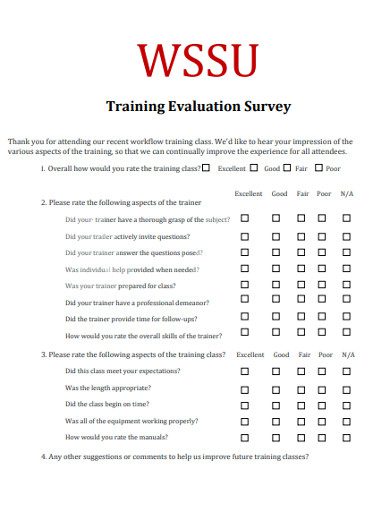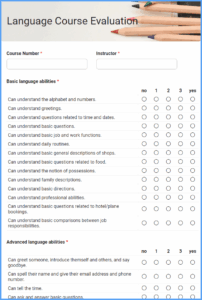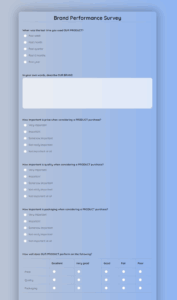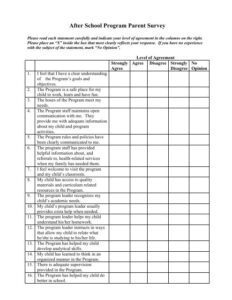Every successful training program, no matter how well-designed or expertly delivered, hinges on one crucial element: feedback. Without truly understanding what resonated with participants, what could be improved, or where expectations weren’t met, it is incredibly difficult to refine your offerings and ensure continuous growth. Collecting meaningful insights helps you gauge the effectiveness of your training, justify its value, and make data-driven decisions to enhance future learning experiences. It’s all about creating a positive cycle of improvement that benefits everyone involved.
However, designing an effective feedback mechanism can feel like a daunting task. You want to ask the right questions, in the right way, to gather truly actionable information without overwhelming your participants. This is where a well-crafted training course evaluation survey template becomes an invaluable asset, streamlining the process and ensuring you capture all the essential details needed to elevate your educational initiatives.
The Indispensable Role of Post-Training Evaluation
Gathering feedback after a training session isn’t just a good practice; it’s an essential component of any robust learning and development strategy. Imagine investing significant resources into developing a course, only to find out later that key sections were unclear, or the content didn’t meet the learners’ practical needs. Without a systematic way to collect participant perspectives, such issues might go unnoticed, leading to recurring inefficiencies and diminishing returns on your training investment. An effective evaluation survey acts as your eyes and ears, providing a direct line to your audience’s experience.

Beyond identifying areas for improvement, post-training evaluation helps you validate the success of your program. It offers concrete data to demonstrate the impact of the training, whether it’s improved skills, increased knowledge, or enhanced workplace performance. This data is crucial for reporting to stakeholders, justifying budgets, and celebrating the successes of your learning initiatives. It transforms subjective opinions into measurable insights, offering a clear picture of what worked well and why.
Moreover, a well-executed survey fosters a culture of continuous improvement within your organization. When participants see that their feedback is actively sought and acted upon, they feel valued and more engaged in future learning opportunities. It signals that their learning journey matters and that the organization is committed to providing high-quality, relevant development experiences. This creates a positive feedback loop, encouraging both learners and trainers to strive for excellence.
Ultimately, effective evaluation ensures that your training programs are not just delivered, but truly learned from and applied. It bridges the gap between theory and practice, helping you understand if the training achieved its intended outcomes and how it can be refined for even greater impact next time. By consistently gathering and analyzing this information, you transform your training from a one-off event into a powerful, evolving tool for growth.
Crucial Elements to Include in Your Evaluation Survey
- Overall Satisfaction: How satisfied were participants with the training experience as a whole?
- Content Relevance and Quality: Was the material pertinent to their needs and presented clearly?
- Instructor Effectiveness: How well did the trainer engage the audience, manage time, and explain concepts?
- Learning Environment: Was the venue, technology, and support conducive to learning?
- Practical Application: How confident are participants in applying what they learned to their jobs?
- Suggestions for Improvement: What specific changes would enhance the course for future participants?
Crafting Your Ideal Training Course Evaluation Survey Template
When it comes to building a training course evaluation survey template, clarity and conciseness are your best friends. You want to gather comprehensive feedback without overwhelming participants with too many questions or complicated phrasing. Start by defining the key objectives of your training program. What did you aim for participants to learn, achieve, or feel? Your survey questions should directly align with these objectives, allowing you to measure the extent to which they were met. Think about the entire learner journey, from pre-course expectations to post-course application.
Consider a mix of question types to capture both quantitative and qualitative data. Likert scales (e.g., “Strongly Agree” to “Strongly Disagree”) are excellent for measuring satisfaction levels and perceived effectiveness across various aspects. Numerical scales (e.g., 1 to 5 or 1 to 10) can also provide quick, quantifiable insights. However, don’t shy away from open-ended questions. These are invaluable for gathering nuanced perspectives, specific examples, and actionable suggestions that structured questions might miss. For instance, asking “What was the most valuable part of this training and why?” or “What specific suggestions do you have for improving this course?” can yield rich, qualitative data.
Structure your template logically, perhaps moving from general questions about overall satisfaction to more specific inquiries about content, instruction, and logistics. Grouping similar questions together makes the survey easier to navigate for participants and simpler to analyze for you. Providing an optional section for additional comments is always a good idea, as it gives participants a space to share anything not covered by the predefined questions.
Finally, remember that the best training course evaluation survey template is one that is actually used and leads to improvements. Keep your language clear, jargon-free, and encouraging. Test the survey internally before launching it to ensure all questions are understood and the flow is intuitive. The insights you gain from a well-designed template are not just about assessing past performance, but about actively shaping a better future for your training initiatives.
Ultimately, the process of collecting and acting on participant feedback is a cornerstone of effective organizational learning. By systematically gathering insights, you not only elevate the quality of your training programs but also reinforce a culture of continuous improvement and responsiveness within your organization. This proactive approach ensures that every learning opportunity contributes meaningfully to the growth and development of your people.
Embracing the power of structured evaluation means transforming raw data into actionable strategies that propel your educational efforts forward. It’s about creating training experiences that are not only engaging and informative but also deeply impactful and continuously evolving to meet the ever-changing needs of your learners.



